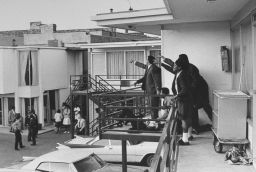Story highlights
D'Army Bailey was a civil rights activist, judge, attorney, author and actor
Bailey founded the National Civil Rights Museum in 1991
D’Army Bailey, a civil rights activist, judge, attorney, author and actor who founded the National Civil Rights Museum in Memphis, Tennessee, has died, the city’s mayor said Sunday night. He was 73.
“Judge Bailey’s passing is a tremendous loss to this community,” Memphis Mayor A C Wharton said in a statement. “My condolences to his family and many friends and colleagues.”
It was Bailey who championed the cause to save the city’s rundown Lorraine Motel and turn it into a museum in 1991.
Martin Luther King Jr. was gunned down on the balcony of the motel on April 4, 1968.
Outpouring

Condolences flooded his Facebook page.
“Judge D’Army Bailey was one of my Civil Rights Hero,” Dee Merriweather said.
“Memphis has lost one of it’s most important voices, minds and spirits today,” posted EJ Friedman.
And from Princess Sylvia Collins: “We love you Judge D’Army Bailey. Your kindness, love and fight for justice will never be forgotten.”
A renaissance man
Bailey’s professional career embraced everything from the courtroom to Hollywood.
Bailey received his law degree from Yale in 1967. He was active in the civil rights movement and practiced law for two decades.
While living in California, Bailey served on the Berkeley city council from 1971-73.
Bailey served as a Tennessee circuit court judge. He was twice nominated to serve on the Tennessee Supreme Court.
Bailey authored two books: “The Education of a Black Radical: Southern Civil Rights Activist’s Journey” and “Mine Eyes Have Seen: Dr. Martin Luther King Jr.’s Final Journey.”
And Bailey had an acting career too.
The Internet Movie Database (IMDb) lists nine acting credits for Bailey, including roles in “How Stella Got Her Groove Back” and “The People vs. Larry Flynt.”
“He was truly a Renaissance man. Scholar, author, actor, activist, city councilor, jurist, husband and father,” Wharton said. “Well done. You will be missed.”


